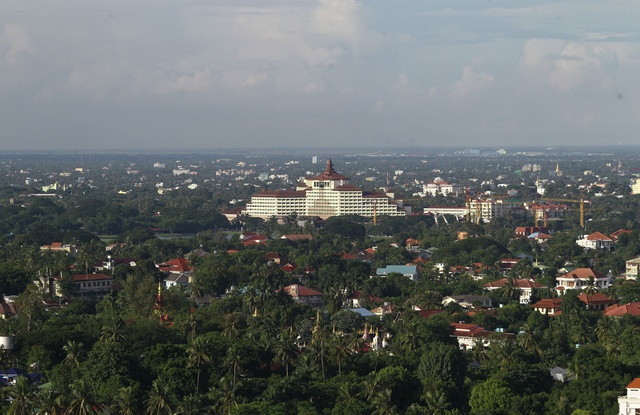Investors met in Naypyidaw this week to discuss ways for Burma to harness its skyrocketing land prices, which analysts say are preventing foreign businesses from entering the market.
Attendees at the Myanmar Investment Forum, held in Naypyidaw from 10 to 11 of September, called on the government to take the issue seriously or risk derailing Burma’s fragile economic transition.
Aung Naing Oo, director-general of the Directorate of Investment and Company Administration told DVB that soaring land prices in Rangoon and other commercial hubs are obstructing foreign companies from investing in the country.
“The [investors] stressed that the land price hike are a hindrance to foreign investment and they discussed the potential causes of this – some think it’s because of supply and demand and some think it’s because of the regulations [imposed by the government],” said Aung Naing Oo.
Property prices in Burma’s main cities have more than tripled over the past few months, making some areas in Rangoon more expensive than New York City. The government has been criticised for failing to impose an effective property taxation regime.
Last year Naypyidaw introduced a 37 percent tax on all property sales, but critics say it has not been collected systematically. Reports suggest that the government is planning to release a new land use strategy by the end of the year.
Satt Aung, deputy-president of the government-run Central Bank of Myanmar said the issue with hike of land prices is common in a lot of countries and Burma should take lessons from its Asian neighbours.
[related]
“It is not only happening in Burma but in many other countries too – India is still facing the issue – and we should look at how [South] Korea tackled it. Singapore also regulates the land sector… [and] Vietnam has set the land prices according to the [sector],” said Satt Aung.
“We should place limits on land prices at a reasonable amount.”
The investors in the forum also discussed other obstacles in Burma’s nascent business environment – such as irregular electricity supplies.
But Satt Aung added that Burma can learn from other countries here too.
“For example, since initiating economic reforms in 1986 Vietnam is still tackling issues related to foreign investment,” he said. “So [all] the challenges we are facing are same as with other countries.”
The Myanmar Economic Forum in Naypyidaw was attended by around 850 entrepreneurs and economic experts from 35 countries.
“Most of the participants in the forum were investors and attendance rates were up from last year,” said Aung Naing Oo. “Most of the discussions focused on [Burma’s economic] reforms and we managed to provide them with statistics on the subject so I think this will assist a great deal with improving foreign investments in our country,” said Aung Naing Oo.
Burma, which is emerging from decades of military rule and economic isolation, has seen an influx of foreign direct investment over the past two years. But many business leaders are still wary about the country’s weak regulatory framework, poor infrastructure and antiquated banking system.



